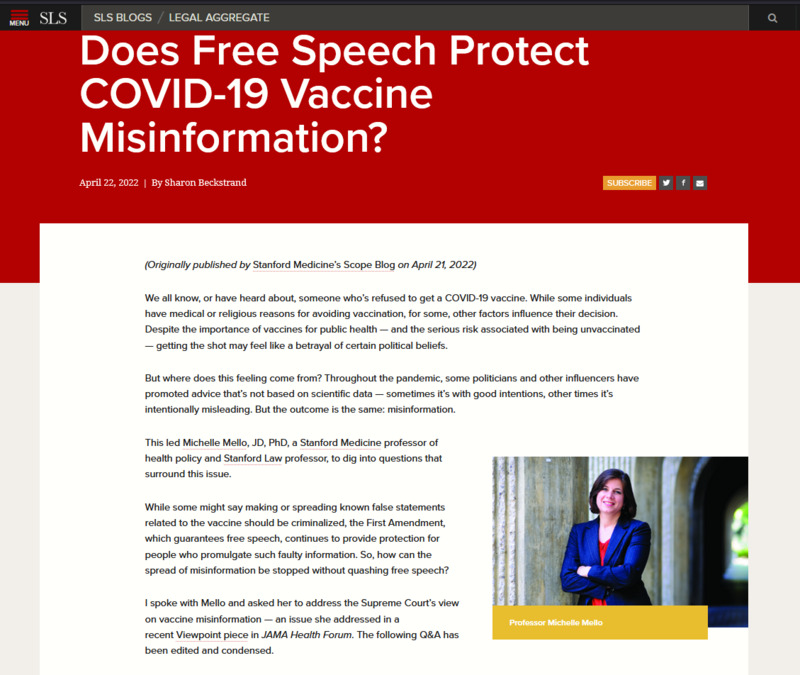Item
Does Free Speech Protect COVID-19 Vaccine Misinformation?
Title (Dublin Core)
Does Free Speech Protect COVID-19 Vaccine Misinformation?
Description (Dublin Core)
This is a story from Standford Medicine's Scope Blog by Sharon Beckstrand. This is an opinion piece on free speech and misinformation as it relates to COVID-19. Beckstrand goes over some of the reasoning some might resist getting vaccinated, such as political beliefs. Some of these beliefs can come from well-intentioned individuals thinking they are spreading good information, or from intentionally misleading sources. Both of these examples are classified under misinformation. The author of this asks: how can the spread of misinformation be stopped without quashing free speech?
To get an idea on how the United States approaches this with the First Amendment is though Supreme Court cases. The Supreme Court has upheld that false statements are still protected under free speech. A 2012 case of United States vs. Alvarez struck down a law that made it a criminal offense to lie about receiving military medals, as a false statement is still protected under the First Amendment.
Other types of speech are not protected, such as: lying in court, making false statements to the government, impersonating a government official, and defaming someone.
Beckstrand lays out some of the dangers that can come from the government trying to police false claims. One thing she asks people to consider is that a scientific statement claimed as false today could be considered verifiable at a different time, especially if it is something that has not been studied yet. Additionally, many do not trust the government to not abuse power when deciding what is misinformation.
The article ends by saying that if something becomes politicized, they are more likely to view messages from groups they don't identify with as suspicious, regardless of how much evidence there is to back it up. At the end, Beckstrand closes with saying that if we cannot make sound decisions on how we interact with information, we can't make sound decisions about health.
To get an idea on how the United States approaches this with the First Amendment is though Supreme Court cases. The Supreme Court has upheld that false statements are still protected under free speech. A 2012 case of United States vs. Alvarez struck down a law that made it a criminal offense to lie about receiving military medals, as a false statement is still protected under the First Amendment.
Other types of speech are not protected, such as: lying in court, making false statements to the government, impersonating a government official, and defaming someone.
Beckstrand lays out some of the dangers that can come from the government trying to police false claims. One thing she asks people to consider is that a scientific statement claimed as false today could be considered verifiable at a different time, especially if it is something that has not been studied yet. Additionally, many do not trust the government to not abuse power when deciding what is misinformation.
The article ends by saying that if something becomes politicized, they are more likely to view messages from groups they don't identify with as suspicious, regardless of how much evidence there is to back it up. At the end, Beckstrand closes with saying that if we cannot make sound decisions on how we interact with information, we can't make sound decisions about health.
Date (Dublin Core)
April 21, 2022
Creator (Dublin Core)
Sharon Beckstrand
Event Identifier (Dublin Core)
HST580
Partner (Dublin Core)
Arizona State University
Type (Dublin Core)
Text story
Link (Bibliographic Ontology)
Publisher (Dublin Core)
Stanford Law School
Controlled Vocabulary (Dublin Core)
English
Education--Universities
English
Government Federal
English
Social Issues
Curator's Tags (Omeka Classic)
public policy
freedom
vaccines
politicization
hospitalization
false
Contributor's Tags (a true folksonomy) (Friend of a Friend)
health
misinformation
law
federal government
Supreme Court
First Amendment
free speech
Standford
Linked Data (Dublin Core)
Date Submitted (Dublin Core)
4/26/2022
Date Modified (Dublin Core)
04/26/2022
08/02/2022
Date Created (Dublin Core)
04/22/2022
Item sets
This item was submitted on April 26, 2022 by [anonymous user] using the form “Share Your Story” on the site “A Journal of the Plague Year”: http://mail.covid-19archive.org/s/archive
Click here to view the collected data.

